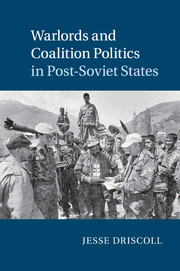Book contents
- Frontmatter
- Epigraph
- Contents
- Acknowledgments
- 1 Revisionist History
- 2 Predator Collusion: A High-Stakes Game
- 3 Kto Kogo?
- 4 Warlord Coalitions and Militia Politics
- 5 Coup-Proofing
- 6 Implications
- Appendix A Case Selection and External Validity
- Appendix B Mathematical Proofs
- Appendix C Ninety-Seven Anonymous Warlords
- References
- Index
- Other Books in the Series
6 - Implications
Published online by Cambridge University Press: 05 July 2015
- Frontmatter
- Epigraph
- Contents
- Acknowledgments
- 1 Revisionist History
- 2 Predator Collusion: A High-Stakes Game
- 3 Kto Kogo?
- 4 Warlord Coalitions and Militia Politics
- 5 Coup-Proofing
- 6 Implications
- Appendix A Case Selection and External Validity
- Appendix B Mathematical Proofs
- Appendix C Ninety-Seven Anonymous Warlords
- References
- Index
- Other Books in the Series
Summary
The processes described in this book are hard to square with the picture of peace building that is typically put forward by optimistic liberal interventionists. The “root causes” of the wars were in no way resolved. Conflict identities between factions were not transformed in any fundamental way. The winners in the consolidation process did not demobilize so much as they became the state. Soldiers watched the daily drama of the consolidation process anxiously, hoping that they were backing the right horse. Many switched factions based on perceptions of whose star was on the ascent. Aid and investment increased the value of the “prize” being fought over in the streets, creating perverse incentives for militia expansion. A ruling coalition formed out of the violent sorting through processes of attrition on the streets. Losers in this process demobilized when they could no longer improve their life chances through violence, but not because there was any sort of security guarantee making them feel safe. Presidents gained power not by legitimizing or strengthening the state, but by subtly influencing the distributional politics associated with its cannibalization. All of this went on under the noses of foreign observers and Russian military peacemakers.
The post-socialist presidents of Georgia and Tajikistan inherited situations of intense institutional weakness. Paramilitary warlords and private armies emerged as power brokers in the chaotic aftermath of state collapse, and the new presidents were forced to incorporate armed factions and known criminals into ruling coalitions. These warlords and their men proceeded to pillage state institutions from the inside, rendering the state increasingly weak and useless. This entailed a great deal of violence and side-switching as coalitions formed and re-formed according to kaleidoscopically complex local logics. Yet over time both Shevardnadze and Rakhmonov were able to use a fairly weak set of institutionalized powers – their ability to bestow selective favors, create redundant ministries with overlapping mandates, bypass the written rules governing transactions between state bodies, and play a focal role in international affairs – to insulate themselves from the threat of a coup.
- Type
- Chapter
- Information
- Warlords and Coalition Politics in Post-Soviet States , pp. 173 - 196Publisher: Cambridge University PressPrint publication year: 2015



